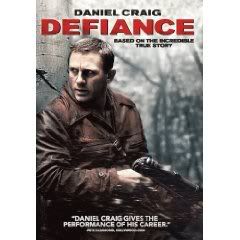REVIEWS
ACTRESSES
Movies free online
Defiance
By necessity, one must focus on the survivors if one wishes to create a workable film about the Holocaust. For its only through the eyes and ears of the survivors (and their tales of suffering) that we can appreciate the enormity, the scope of what occurred to the victims of the Holocaust. Paradoxically, the tales of the survivors are nothing more than anomalies--which may give the wrong impression to the uninformed that the Holocaust was an ennobling event--that these tales of survival were somehow the rule rather than the exception.
Defiance is one such anomalous tale. Some critics have likened it to a critique of Jewish passivity--that the overwhelming majority of Jews went to their deaths without putting up a fight. And certainly that reputation is reinforced in 'Defiance' as the protagonists, Tuvia and Zus Bielski, stand out as Jewish outsiders who aren't afraid to fight the Nazis as opposed to the majority of the Jewish 'intellectuals', mostly freshly minted refugees from the ghetto, who end up as part of the Bielski 'community' within the Byelorussian forest.
But there is an excellent scene in Defiance, where Tuvia sneaks into the ghetto and confronts the head of the Jewish committee there, that demonstrates that the average Jew was not passive--simply bewildered and overwhelmed. Can you really blame the head of the Jewish committee when he doesn't believe Tuvia's tales of genocide? He says, 'yes, we've heard these stories, but who can really believe them?' Reports of atrocities reached the United States during the War but they were not really appreciated until the actual newsreel photos of truckloads of emaciated bodies were seen being bulldozed into ditches at Bergen-Belsen after the war was over.
The opening scenes of 'Defiance' are testament to the brutally swift nature of the Nazi genocide. In most cases, there was simply no time to think about resisting (or escaping). The Nazis came in, along with the help of the local authorities in the occupied territories and murdered the Jews in the blink of an eye. We see this very effectively illustrated in 'Defiance' after the Bielskis find their parents murdered on the family farm.
One of the picture's strengths is that it also illustrates the role of the local collaborators who assisted the Nazis. In a dazzlingly effective scene, Tuvia takes revenge by shooting the local police chief and his sons after they've murdered his parents. The collaborators aren't seen as monsters--quite the contrary, in a humanized portrait, the police chief begs for his life and insists he was forced to act at the bidding of his superiors in the Nazi occupation force (in an earlier scene, the police chief comes to a farm looking for one of the Bielski brothers who hides in a barn after attacking a group of Nazis--here the police chief is much more crass and arrogant--but still all too human!).
Nonetheless, Zwick, the film's director, should have had another scene involving the collaborators to balance out the 'sympathetic' portrait. The truth of the matter was that there were other of these local collaborators who were outright sadists, capable of incomprehensible, monstrous acts of brutality. Similarly, Zwick shows us a group of Jews in the forest who end up savagely beating a captured German soldier to death (despite his cries that he has a wife and children). While such acts of revenge did occur, it's hard to appreciate the context for their actions (it would have been better if Zwick had actually shown the Bielski parents, for example, being murdered and not merely the aftermath).
A good deal of 'Defiance' explores the conflict between the two brothers. Tuvia is the pragmatic one who comes to accept his role as a new 'Moses', leading his beleaguered group of 'intellectuals' to safety through the forest. At first he has only contempt for his fellow Jews who he regards as cowardly and passive. But as time passes, they earn his respect as they all become more proactive. Zus, on the other hand, wants to take direct action against the Nazis and joins the Soviet partisans as one of their fighters. I thought that the characterization of the Russians was one of the strongest parts of the movies. They are depicted sympathetically--shown both for their courage and brutality (Zus eventually leaves the partisans after he can no longer tolerate their anti-semitic stance).
A good part of 'Defiance' is taken up showing life in the forest camp. The characterizations are a mixed bag. Some of the characters are standard 'types' (the debate between the 'intellectual' vs. the 'spiritual' Jew is one such example). There are some good scenes depicting the malnourishment that the community had to endure along with a few obligatory romances. One scene I had a hard time believing was when Tuvia kills one of the food hunters who insists that his group gets extra portions of rations. Did that really happen? I'm not sure but it made for good drama.
I like Daniel Craig in this role a lot more than as James Bond; he gives a solid performance as an unlikely savior for his people. And Lev Schreiber is excellent as the tough as nails partisan who eventually reunites with his brother after a fractured relationship.
'Defiance' loses credibility in the final scene when the community battles a large group of Nazi soldiers backed up by a tank. I can't imagine that this actually happened. Nonetheless, I don't want to be too hard on Defiance. It's a film that will keep you absorbed from the opening credits. As a little known history lesson, it does its job. And certainly it was a worthy project to commemorate the deeds of the heroic Bielski brothers.
Posted by : Ela on
|
Labels:
action,
all about movies,
Defiance,
movies review
|
